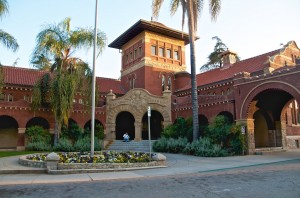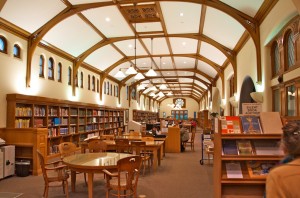March 2, 2012
Pioneertown, California
 Yesterday, as part of my visit America campaign, Sukulina and I went on a driving trip that was supposed to take us skiing. We drove through the high desert to the small village of Lucerne, and then headed up into the Big Bear Mountain’s, east of Los Angeles, to the ski slopes. One often hears that in Southern California you can ski in the morning and surf in the afternoon, and its true. The resorts of Big Bear fulfill the ski side of this pleasure equation. Unfortunately, we arrived at 2 o’clock in the afternoon to find that the ski lifts close at 4. We were unable to ski. I had assumed there was night skiing and everything would stay open till late. I was wrong. But this is the nature of an adventure. One never knows what to expect. At least now, if we decide to go skiing we know how. Continuing the adventure we headed down the other side of the mountain into the Los Angeles area to the small city of Redlands.
Yesterday, as part of my visit America campaign, Sukulina and I went on a driving trip that was supposed to take us skiing. We drove through the high desert to the small village of Lucerne, and then headed up into the Big Bear Mountain’s, east of Los Angeles, to the ski slopes. One often hears that in Southern California you can ski in the morning and surf in the afternoon, and its true. The resorts of Big Bear fulfill the ski side of this pleasure equation. Unfortunately, we arrived at 2 o’clock in the afternoon to find that the ski lifts close at 4. We were unable to ski. I had assumed there was night skiing and everything would stay open till late. I was wrong. But this is the nature of an adventure. One never knows what to expect. At least now, if we decide to go skiing we know how. Continuing the adventure we headed down the other side of the mountain into the Los Angeles area to the small city of Redlands.
Sukulina suggested we visit the Smiley Library, which is an historic site within that city. My photos shown here show the beauty and charm of this building and it’s surrounding area.
However for me, what was more important than the architecture of this building, were the actual books, the library stacks. As a student, books were my life and soul and I spent 30 years of my life sitting in the stacks of libraries. At home I still have a large collection, yet this was the first time in 25 years that I’ve actually gone into a library and seen the stacks. During my student days I remember spending hours on end browsing library shelves. I almost lived in the library stacks. So often a good book would seek me out and force me to read for hours in the library’s lounge area. While my friends were out enjoying social life on a Friday evening, I would read in the stacks till midnight. I love books!
Regrettably books are no longer an important part of my life. Actually this is not true, what I really mean is that paper books are no longer as important to me.
For better or for worse paper books are a dying commodity as they are slowly being consumed by the electronic book. It used to be the card collection was the heart and soul of every library. Today, no library maintains a card collection. Card catalogues have been replaced by computer databases connected to a global network. In fact, few people go to a library to search for a book anymore; they do that from home before they obtain the book from the library. Within the next decade, I fear the same fate awaits the book collection itself. Instead of getting a book from a brick and mortar library we will download a digital copy of the book from an online library or other online source. The paper book as we know it will mostly become a museum piece along with the buildings that holds them.
Apple, the digital electronics company, recently released software that allows any individual to easily create their own
electronic book and then distribute that book over a worldwide network and even sell it for a profit. This is astounding! Similarly, they are encouraging textbook companies to create electronic textbooks with the same software. No longer will students have to lug heavy textbooks; instead they will carry a simple book reader that will hold not just one or two textbooks, but all their books. Indeed these readers can hold almost unlimited numbers of books. I teach a Sanskrit class and I no longer use my huge Sanskrit dictionary that needs a wagon to haul it around, instead I’m accessing an online dictionary through my tablet computer. The same for my French grammar and dictionaries. Everything I need can be accessed on my tablet computer or even on my cell. I hardly use any of the paper books in my home collection anymore. Instead I access everything online.
What I describe here must be understood in the context of a person who grew up in a time without any computers, where even the word ‘computer’ was unknown. My home had just one small black and white television. Our family telephone was a rotary phone on a party line and color photography was unheard of. This was my world growing up. How much the world has change astounds me. It’s like magic.
 These days I make it my business to stay a breast of digital technology, so I may be a little ahead of the rest of society, but digital technology is slowly sinking into everyday culture. It is only a matter of time before traditional textbook companies start producing their books solely in electronic format and virtually every book is published as an ebook. As tablet computers and wireless technology become even cheaper and widely available more and more electronic books will appear. Electronic books have been available for decades on desktop and laptop computers, but it is only with the rise of the small and inexpensive hand held tablet, the book reader, along with inexpensive and fast cellular wireless that this change has been truly possible. With a tablet or book reader the reading experience becomes close and personal. One can curl up with a book reader in front of a fire place; you would never do this with a laptop let alone a desktop computer. And it all starting now; literally millions of books and magazines are at anyone’s finger tips instantly, anywhere and cheaply. And even more, these new electronic books can be interlaced with video, audio and other media forms; things that could never be done with a paper book. And all this information can be kept current. Traditional paper books are heavy, bulky, expensive and they become outdated quickly. In other words, the end of the book as we know it is imminent, which also means the end of the traditional library as well. This beautiful library building, the Smiley Library that I visited in Redlands California is sure to become a relic of the past. It will become a museum. As libraries card collections have disappeared so their paper book collections will also disappear along with their buildings.
These days I make it my business to stay a breast of digital technology, so I may be a little ahead of the rest of society, but digital technology is slowly sinking into everyday culture. It is only a matter of time before traditional textbook companies start producing their books solely in electronic format and virtually every book is published as an ebook. As tablet computers and wireless technology become even cheaper and widely available more and more electronic books will appear. Electronic books have been available for decades on desktop and laptop computers, but it is only with the rise of the small and inexpensive hand held tablet, the book reader, along with inexpensive and fast cellular wireless that this change has been truly possible. With a tablet or book reader the reading experience becomes close and personal. One can curl up with a book reader in front of a fire place; you would never do this with a laptop let alone a desktop computer. And it all starting now; literally millions of books and magazines are at anyone’s finger tips instantly, anywhere and cheaply. And even more, these new electronic books can be interlaced with video, audio and other media forms; things that could never be done with a paper book. And all this information can be kept current. Traditional paper books are heavy, bulky, expensive and they become outdated quickly. In other words, the end of the book as we know it is imminent, which also means the end of the traditional library as well. This beautiful library building, the Smiley Library that I visited in Redlands California is sure to become a relic of the past. It will become a museum. As libraries card collections have disappeared so their paper book collections will also disappear along with their buildings.
This shift to digital format and the distribution of information through wireless networks both saddens me as well as gives me great joy. I get joy knowing that so much information is instantly available and that I have access to the world’s libraries, art galleries and other cultural institutions at my fingertips, yet I am saddened knowing that these library stacks, the places where I once sat and dreamed of life’s possibilities, will soon be gone forever. There is indeed something deeply satisfying and almost magical about holding a paper book in one’s hands and turning its pages as one settles into a library lounge for an evening of reading and dreaming.


